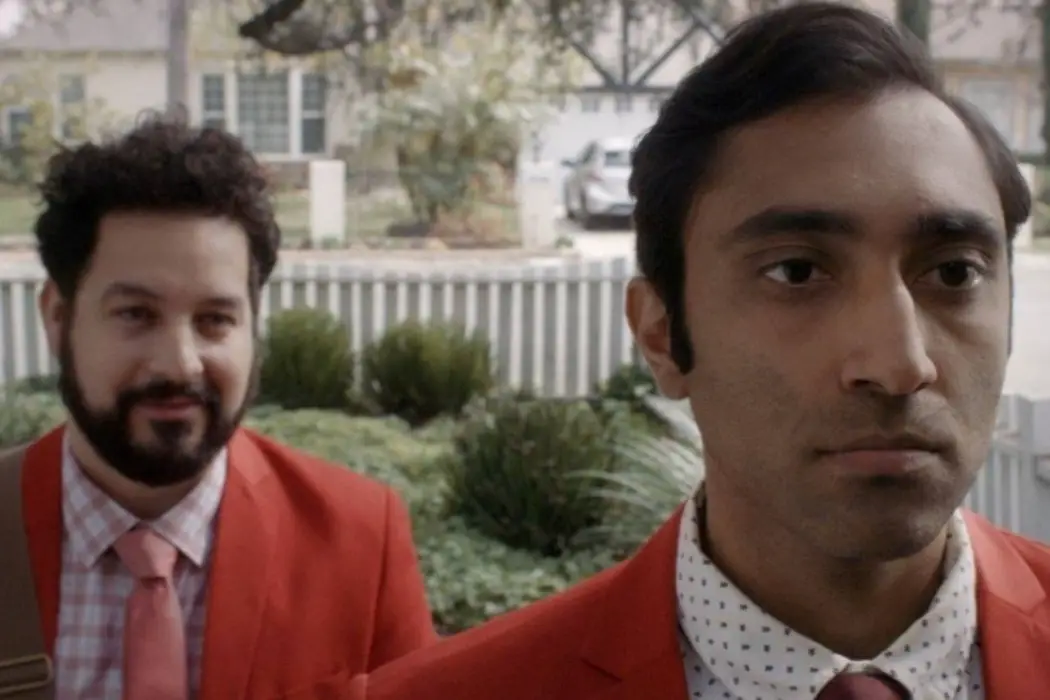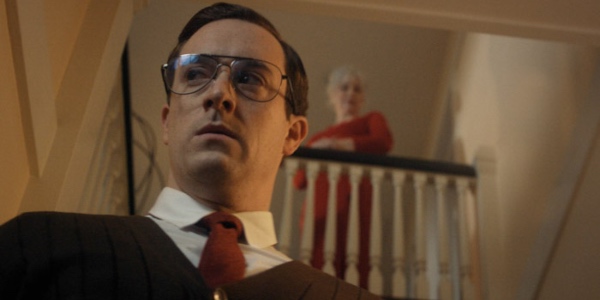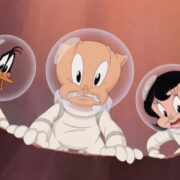KEEPING COMPANY: Are You A Shark?

Stephanie Archer is 39 year old film fanatic living in…
Horror films are the perfect vehicle for critical examinations of society, behavior, and emotion. It can reach into the depths of the subconscious and speak volumes between its lines of dialogue and sequences of mayhem. And while some are more successful than others in this attempt, each strives to capture something between the fear and the gore. For Josh Wallace’s Keeping Company, it’s all this and more with a flair of cult and camp to round it out.
The moment Keeping Company opens, the camp feeling ruminates and stays ever present. A crime, a horror, a comedy, and even a thriller, Keeping Company taps into the best elements of cinema to deliver a deep examination of greed, capitalism, and the wealthy, all while remaining entertaining along the way.
A Menagerie of Parts
Keeping Company tackles a few storylines, unveiling them in a well-paced manner and even more carefully interweaving them within one another. It’s this interwoven design of narrative that heightens the already campy feeling of the film, lending it to a higher degree of unpredictability. From the beginning, viewers are briefly introduced to the mysterious Lucas (Jacob Grodnik), who is seen flagging down someone on the side of the road, scenes later proving this not to be a friendly pickup.
Viewers do not stay with Lucas for long, or discover any minute sense of his intentions, wafting a layer of intrigue to his part in the film. Rather, viewers are transitioned to a TV campaign ad for the district attorney. As he literally waves a broom at the pavement and is homeless as he “cleans” the street, the campy feeling is further heightened and the film begins to take on the sense that each moment is a piece to an even bigger puzzle. Where elements may seem small and random, they may not truly be that at all.

Keeping Company moves along quickly, bringing in more of its central cast. It settles briefly on Sonny (Devin Das) and Noah (Ahmed Bharoocha), sales representatives for the local life insurance company. Their dynamic is hilarious and Das and Bharoocha work well with one another to deliver not just contrasting sales techniques, but a contrasting outlook on life. Their matching red suits may speak to a company-induced uniformity, but Sonny and Noah couldn’t be any different.
Keeping Company is not satisfied with a limited set of working characters to move throughout the narrative, introducing the fraudulent Insurance CEO Paula (Gillian Vigman), Caste employees Frank (Andy Buckley) and Danika (Medina Senghore), Grandma (Suzanne Savoy), and Sonny’s dad, Mr. Reddy (Bernard White). Each seems to deliver a new layer of mystery and intrigue, yet never seems to outshine the others creating a fluid menagerie of characters to work with.
Many indie horrors would find this method of character flooding a detriment to its structure and effectiveness in the story, yet Keeping Company wields it as a strength, its various characters avoiding the pitfalls of weighing the film, rather giving it breadth to examine its focus from all avenues.
Red Coated Capitalism
For the entirety of Keeping Company, red is the prominent color palette. From set to costume design, red is a dominating force. From the red-coated sales representatives pushing the corporate agenda to the red dresses of the corrupt woman fronting their masked corporate intentions to the red ties and shirts that indicated lower-level workers carrying on the actions of those they serve, red is always in sight. Where some may see it as a mark of death, others as an indicator of shared blood on their hands.

Keeping Company brings an interesting perspective and examination to its forefront, looking deeply at the corporate greed, those who, even unknowing, encourage it, and its various ripple effects. Each aspect is driven by the consuming nature of getting what one wants and the willingness to do anything to survive. As greed and perceived necessity dictate their behaviors, the ripples they cause reach further than they could ever have predicted – or cared to predict.
Keeping Company becomes engulfed in its messaging, hitting each mark in a unique and poignant fashion with the idea of a corrupt system and the constant inclusion of the film’s predominant color palette. And while there is a critique, there is also a pondering, contrasting characters shedding their reluctance giving the sense that to fight and push forward for their desires and the shielded desires of others is how one survives within this society. That idyllic hopes are nothing in comparison to the shark taking a bite out of the opportunity. That at the end of the day, it is eat or be eaten.
Conclusion
Keeping Company weaves both a critical look at society and the greed-fueled power and consequence of capitalism all while crafting a film that delivers both humor and horror in what promises to fit in the annals of camp film culture. And while predictable in its direction at times, especially in its biggest reveal, it still retrains both the spirit and dedication from start to finish.
Have you seen Keeping Company? What did you think? Let us know in the comments below!
Keeping Company is now available on VOD.
Watch Keeping Company
Does content like this matter to you?
Become a Member and support film journalism. Unlock access to all of Film Inquiry`s great articles. Join a community of like-minded readers who are passionate about cinema - get access to our private members Network, give back to independent filmmakers, and more.













